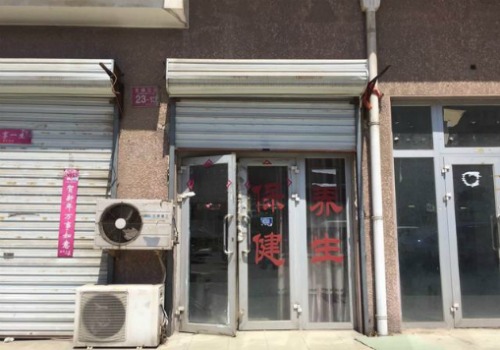Some netizens already call it one of the biggest controversies of the year. The death of the 29-year-old environmentalist Lei Yang – while in police custody – has sparked online outrage, with many connecting this fatality to police brutality. Now Lei’s wife has stepped forward, demanding answers from Beijing authorities on the circumstances surrounding her husband’s death.
The death of the 29-year-old Beijing resident and environmentalist Lei Yang (雷洋) has sparked national outrage, with many Chinese suspecting that police violence led to his death.
According to police statements, Lei Yang was arrested for visiting a brothel (featured image) and died while resisting his arrest. Camera recordings of his arrest were reportedly unavailable after the police phone device that was used for filming the arrest broke down. But Lei’s family is not satisfied with police reports on the circumstances that led to Lei’s death. Lei just had a baby two weeks earlier and was on the way to the airport to pick up relatives.
 CCTV interviewing Lei’s family.
CCTV interviewing Lei’s family.
The wife of Lei Yang headed to Beijing’s prosecutor’s office with her lawyer on Tuesday, May 17, demanding further investigation into her husband’s death. She also filed a complaint for abuse of power, forgery of evidence, and physical assault. According to the complaint report that circulated on Chinese social media, she alleges that the prostitution story was a setup and that her husband was beaten to death.
Lei Yang Incident
At around 9.00 pm on Saturday night, May 7 2016, Lei Yang left home to pick up some relatives from Beijing airport who came to visit from Hunan to see Lei’s newborn baby girl. On the way to the airport, somewhere between 21:04 and 21:16, Lei arrived near the location of a foot massage parlor, coming from Longjin 3rd Street (these two places and exact times were confirmed through monitoring data according to a Chinese newsblog).
It was within this time frame that Lei was arrested by 5-6 plainclothes officers, allegedly for purchasing sexual services. Shanghai Daily reports that several witnesses saw Lei running from the undercover policemen and screaming for help immediately before his arrest.
According to one officer, Lei had “stopped resisting and was very quiet” in the car on the way to the police station. About 50 minutes after Lei was taken to the Changping district police station, he was rushed to a nearby hospital. Within two hours after his arrest, at 22:55, Lei was pronounced dead.
Family members were notified of Lei’s death at 1:00 am. According to family members who could see Lei’s body under police supervision, he was bruised on his head and arms, and also had other injuries. According to SCMP, they were not allowed to take pictures of the body.
Police state that no excessive force was used during Lei’s arrest, and that DNA evidence from a condom suggests that Lei indeed visited the brothel.
“Sudden death of suspect”
The Changping police station has responded to the incident through its official Weibo account, where they released an offical statement on May 9 and May 11 on the “sudden death of a suspect for prostitution”.
According to the police statement, undercover officers went to the massage parlor after getting a tip about prostitution activities and caught five men visiting prostitutes at the scene. The statement then says that one of suspects, Lei Yang, violently resisted his arrest and bit one of the policemen. During the course of this struggle, the camera equipment of the officer fell and broke. In the car on the way to the police station, Lei allegedly tried to kick the driver and attempted to escape, and had to be controlled and restrained with handcuffs. When the police later discovered his body was lifeless, Lei was taken to the hospital.
This police statement shows much resemblance to a similar case that took place in the Netherlands in 2015 when an Arubian man died during a violent police arrest. Although local police initially stated the man lost consciousness in the car on the way to the station, bystander footage later showed the man already was unconscious during his arrest (story and video).
The Changping police statements on Weibo received over 32.800 comments, with many netizens pleading for evidence.
Social media reactions
The Lei Yang incident has drawn much controversy on Chinese social media for the past week, with many netizens arguing for a thorough investigation of the case. Some Weibo users complained that their posts about the issue were being deleted by censors.
One netizen called Mr. Lu says: “I don’t care if this gets censored, but since Lei Yang’s wife and her lawyer have taken action, you hear all kinds of things coming from the police about visiting prostitutes so and so, but the fact remains that he died. No matter what crime he committed, this family has the right to call his death into question, and we support this right!”
Some netizens stress the importance of this case: “The Lei Yang Case is already the most important incident of 2016. For the people, for the government, for the police, for the media, and for lawmakers.”
There are also netizens who do not find Lei’s death suspicious: “Why is his sudden death so unlikely?” one netizen wonders: “There are people suddenly dying every day, why could this not be the case now?”
Although it is unsure what exactly happened on May 7, most netizens just want to know the truth: “Without investigation, there is no truth. Without the truth, we could be the next Lei Yang.”
“We are angry and scared because we all could be the next Lei Yang,” another Weibo user says: “We follow this case because of our sense of justice, but also because we’re afraid and angry. In a society without respect for life and no dignity and human rights, we could all be led to our death by police – whether we’re visiting a prostitute or not.”
A Shaanxi public security bureau also responded to the case through their Weibo account, saying: “There are many people online who call the voice of the police into question. As colleagues of the Changping police, we analyze this case from a legal and objective point of view, and we will fight back rumors.”
In the meantime, China Daily reports that an autopsy on Lei’s body has been carried out, and that results are expected to be released within 20 days.
UPDATE: READ HERE
– By Manya Koetse
©2016 Whatsonweibo. All rights reserved. Do not reproduce our content without permission – you can contact us at info@whatsonweibo.com.


 China Insight9 months ago
China Insight9 months ago
 China Music10 months ago
China Music10 months ago
 China Insight11 months ago
China Insight11 months ago
 China Digital8 months ago
China Digital8 months ago



























